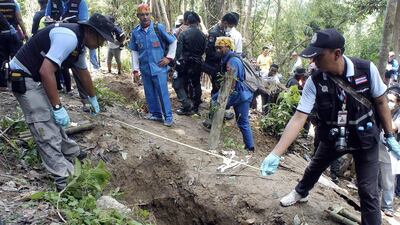KUALA LUMPUR // Mass graves feared to contain the bodies of Bangladeshi and Rohingya migrants at the centre of a regional human-trafficking crisis have been found in Malaysia.
Home minister Zahid Hamidi said, according to The Star newspaper, the graves were found near suspected detention camps run by people-traffickers.
“But we don’t know how many there are. We are probably going to find more bodies,” Mr Zahid was quoted as saying on Sunday.
Thai police found secret human-trafficking jungle camps on their side of the border and dozens of shallow graves in early May.
The report quoting Mr Zahid gave few details but the Malay-language newspaper Utusan Malaysia, citing an unnamed source, earlier reported that about 30 mass graves had been found containing "hundreds of skeletons".
The Star had said the graves were "believed to contain nearly 100 Rohingya migrants".
Thailand began a crackdown on human trafficking and smuggling following the discovery of its mass graves, which appears to have thrown regional trafficking routes into chaos.
Many migrants previously tried to enter Malaysia via its land border with Thailand.
With traffickers apparently now abandoning their human cargo at sea, boats filled with hundreds of starving migrants from the two countries have sought desperately to land in Malaysia, Thailand and Indonesia, which initially turned them away.
Facing growing international pressure, Malaysia and Indonesia last week said they would admit boat people, who are to be repatriated or resettled with the help of international agencies.
Indonesia’s military said on Sunday that president Joko Widodo had ordered the country to start search and rescue operations for stranded migrant boats, an operation that began Friday.
“We will save the migrants and take them to shore,” military spokesman Fuad Basya said, adding that as of late Saturday, no new boats had been sighted.
Previously, Indonesian fisherman have helped hundreds of stranded Bangladeshis and Rohingya to shore.
The Malaysian government announced on Thursday that its navy and coastguard would be mobilised for search operations but so far it has not reported any rescues.
Mr Widodo indicated on Sunday that Jakarta would need help footing the bill for housing thousands of destitute people.
“We’re counting and making calculations on the costs involved,” he said, according to Detikcom news website. “We still need international support on how this would be managed.”
More than 3,500 migrants have swum to shore or been rescued off the coasts of Malaysia, Indonesia, Thailand and Bangladesh since the crisis erupted earlier this month.
Malaysian media said the latest mass graves were found near Padang Besar and Wang Kelian, two towns along the Thai border in the Malaysian state of Perlis.
Police declined to release information but the national police chief will hold a press conference on the matter on Monday.
Malaysia’s government had previously denied that any such mass graves or slave camps existed on its soil.
“I am shocked!” Mr Zahid said.
He added that some of the camps may have been there for as long as five years, and that Malaysian citizens were suspected to have been involved.
Most Bangladeshis are economic migrants seeking to escape poverty at home.
The Rohingya leave Myanmar in large part to escape discriminatory treatment from the Buddhist majority. Myanmar insists the Rohingya are illegal immigrants from Bangladesh and denies citizenship to most of them.* Agence France-Presse

